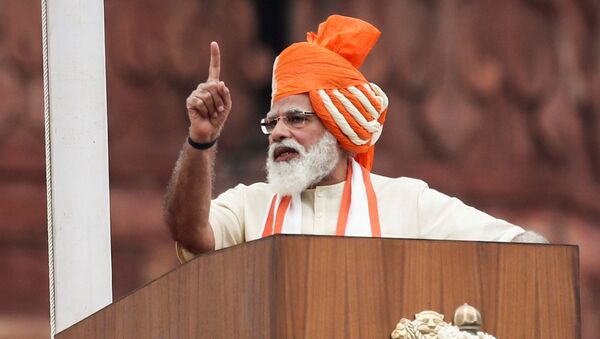Improving ties between India and the Sunni Gulf monarchies in the Middle-East, most notably Saudi Arabia and the United Arab Emirates (UAE), under Prime Minister Narendra Modi has been the “biggest” success story of New Delhi’s foreign policy in the past six years, former Indian envoys to the region have told Sputnik.
“It is important to appreciate that even as New Delhi has taken its relations with oil-rich Saudi Arabia to an entirely new level, the Modi government at the same time has been careful to continue our traditional and civilisational ties with Iran,” points out Anil Trigunayat, India’s former Ambassador to Jordan, Libya and Malta.
“In spite of the threat of American sanctions and pressure on New Delhi from Donald Trump's outgoing administration not to be so reliant on Iranian crude imports, Modi's government has done a fine balancing act,” says Trigunayat.
In the financial year 2018-19, India was the biggest buyer of Iranian crude, importing 23.5 million tonnes during the period. However, New Delhi was forced to tone down its crude imports from Tehran to zero last year after the Trump administration refused to extend waivers as it imposed unilateral economic sanctions on Iran after walking out from the Joint Comprehensive Plan of Action (JCPOA).
The former diplomat recalls that New Delhi has increased co-operation with both Saudi Aramco and the Abu Dhabi National Oil Company (ADNOC) in recent years, noting that policy-makers in Asia’s third-largest economy have been forced to diversify because of American sanctions on Iran.
Trigunayat says that New Delhi has been able successfully to “straddle” the Saudi Arabia-Iran rift in the region and been able to maintain cordial ties with both the competing blocs in west Asia.
“Our involvement in Chabahar Port despite the threat of American sanctions on the Iranian shipping industry signals New Delhi’s commitment towards maintaining cordial ties with Iran,” notes Trigunayat, who is a regular commentator on India’s policy in the Middle East.
“Despite their political differences, neither Saudi Arabia, the UAE, nor Iran has ever quizzed India about its ties with the other party,” he adds.
He also says that New Delhi's backing of the Abraham Accords (UAE-Israel Peace Talks) also showed how it had been "tiptoeing" around the geopolitical differences in the region.
Maiden Visit of Indian Army Chief to Saudi Arabia, UAE
Former Indian Ambassador to Riyadh, Talmiz Ahmad reckons that the visit India's Army Chief, General Manoj Mukund Naravane paid Saudi Arabia and the UAE this month showed an improved level of trust between the two countries.
Naravane’s visit to the “leaders of the Sunni world” was the first by a serving Indian Army chief.
“Saudi Arabia now wants greater co-operation with India to fight terrorism. This marks a shift from its earlier policy,” says Ahmad, who has also served as India’s top envoy in Oman and the UAE.
He also points out that both Riyadh and Abu Dhabi have granted India’s request to extradite suspected terrorists, which hadn’t been the case earlier.
In recent years, Saudi Arabia has vocally supported the ongoing efforts to adopt formally the Comprehensive Convention on International Terrorism (CCIT), a proposed treaty that seeks to criminalise terrorism in all forms. New Delhi, which has often complained about “Pakistan-backed” cross-border terrorism, has been one of the keenest supporters of CCIT.
But adopting the convention continues to be resisted from a bloc within the Jeddah-headquartered, 57-nation Organisation of Islamic Cooperation (OIC). For instance, Pakistan has reportedly expressed reservations about the definition of terrorism in the proposed CCIT treaty.
Ahmad, however, cautions that it would be too early to speculate whether New Delhi would be interested in putting boots on the ground to support Saudi Arabia and the UAE’s security needs. Although Pakistan's Army has supported the Saudi Arabia and the UAE military by sending troops and fighter jet pilots, the defence co-operation has recently become frayed because of Islamabad’s backing of a competing Turkey-Malaysia bloc.
Besides, Ahmad says the large Indian ex-pat presence in the Gulf makes a good case for expanding energy ties and increasing co-operation in counter-terrorism, as the region is “significant” for India.
The Gulf Co-operation Council (GCC) countries represent a community of 9 million Indian immigrants, sending back about $37 billion in 2018-19. Globally, the UAE tops the list of foreign donors to India, with Saudi Arabia and Kuwait also among the top five.




